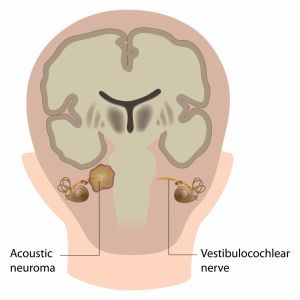|
www.HealthyHearing.com |
When hearing loss is caused by a brain tumorAcoustic neuromas are usually benign, but cause many symptoms
Contributed by Joy Victory, managing editor, Healthy Hearing Key points:
The human ear is connected to the brain via the auditory nerve. Sometimes, a tumor can grow along this auditory nerve, known as an acoustic neuroma. While scary, these rare, slow-growing tumors are almost always benign, meaning they will not spread. However, they can cause significant symptoms and require complex brain surgery. Symptoms of acoustic neuromaHearing loss in one earOne of the most prominent symptoms is single-sided hearing loss, meaning hearing loss in one ear, or unilateral hearing loss. This causes unique hearing challenges because hearing is no longer "in stereo." Also, speech can sound more muffled, particularly high-pitched parts of speech. Depending on the size and location of the tumor, the degree of hearing loss may range from mild to severe. Symptoms can be subtleAt first, there may be no symptoms, or they may be so subtle you don't notice them. When an acoustic neuroma grows and presses against neighboring cranial nerves or brain structures, it can cause a variety of physical problems. Because your hearing and balance share a nerve pathway to the brain, both can be affected. Other symptoms besides hearing loss may include:

vestibular schwannomas. They grow on the auditory nerve, which is also called the vestibulocochlear nerve. Other names for the conditionAccording to the National Organization of Rare Diseases (NORD), you may hear doctors use several different terms for the condition, including:
How common are they?NORS states they occur in one of every 100,000 people who are between the ages of 30 and 60. They affect more women than men. Approximately 2,500 new cases are diagnosed each year. What causes acoustic neuromas to grow?Medical professionals aren’t certain what causes acoustic neuromas. Most of these tumors appear spontaneously, without any previous health condition or genetic predisposition. However, in some cases people inherit a genetic disorder known as neurofibromatosis 2, which causes tumors to grow on nerves. Other risk factors include loud noise exposure, childhood exposure to low-dose radiation of the head and neck, and a history of benign tumors in the parathyroid glands in the neck. DiagnosisBecause the majority of these tumors cause subtle symptoms for a long time, they are often difficult to diagnose. If your doctor suspects you have an acoustic neuroma, she may refer you to an audiologist and an otolaryngologist (an ear, nose, throat doctor) or neurotologist to have the following tests:
You may also be referred to an audiovestibular specialist to help you learn to live with the hearing, balance and communication challenges that may arise from having an acoustic neuroma. Acoustic neuroma treatmentsTreatment depends upon the tumor's size, location, and your physical and hearing health. Options include:
More aggressive treatment is usually recommended for people with neuromas that are near or pressing on the brain stem, which regulates basic functions like breathing. Large tumors may lead to a build-up of cerebrospinal fluid, causing fluid to pool in the brain, known as hydrocephalus. These tumors can be life threatening. Also, in some cases the tumor may grow back. Notable stories from survivorsStories from people who have had acoustic neuromas reveal what the treatment process is like. Former Kansas City Chiefs cheerleader Shanna Adamic spent six years trying to get help for right-sided hearing loss, headaches, vision changes and slurred speech, according to an article published in The Daily Mail. An MRI revealed a golf-ball sized tumor, who was removed during a 13-hour neurosurgery. Wife of NFL Rams player Matthew Stafford, Kelly Stafford first noticed a loss of balance and coordination, which turned into severe vertigo. An MRI revealed a large tumor. She too faced a long neurosurgery. Actor Mark Ruffalo had a similar story although his tumor was found quickly. Like Stafford, he still struggles with hearing loss, and also some partial paralysis in his face. Coping with acoustic neuromasIf you’re diagnosed with an acoustic neuroma, it's normal to feel upset and scared. In most cases, acoustic neuromas are bothersome but not life-threatening. Your medical team will help you decide whether or not surgery is an option and how to cope with any uncomfortable symptoms—such as headaches, dizziness or tinnitus—caused by the tumor. The most important thing to remember is to follow the recommended plan of treatment and see your healthcare professionals regularly to keep an eye on things. In the US, the Acoustic Neuroma Association provides support groups and resources, and may be helpful to you as you navigate the healthcare system. If you're in Canada, you can reach out to the Acoustic Neuroma Association of Canada, and the British Acoustic Neuroma Association in the UK. Joy Victory, managing editor, Healthy Hearing
|
Featured clinics near me
Earzlink Hearing Care - Reynoldsburg
7668 Slate Ridge Blvd
Reynoldsburg, OH 43068

Find a clinic
Need a hearing test but not sure which clinic to choose?
Call 1-877-872-7165 for help setting up a hearing test appointment.


 Joy Victory has extensive experience editing consumer health information. Her training in particular has focused on how to best communicate evidence-based medical guidelines and clinical trial results to the public. She strives to make health content accurate, accessible and engaging to the public.
Joy Victory has extensive experience editing consumer health information. Her training in particular has focused on how to best communicate evidence-based medical guidelines and clinical trial results to the public. She strives to make health content accurate, accessible and engaging to the public.